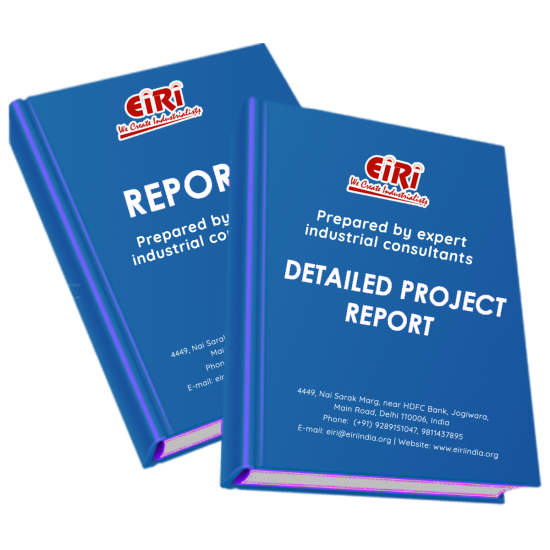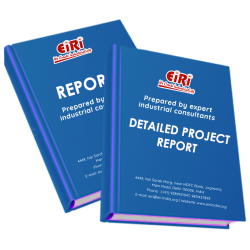Ferro Alloy with 6 MVA Furnace capacity (Silicon Manganese) (Production Capacity: 30 MT/Day)

- More than 40 years of experience
- Managed by expert industrial consultants
- ISO 9001-2015 Certified
- Registered under MSME, UAM No: DL01E0012000
- 24/5 Research Support
Get your quesries resolved from an industry expert. Ask your queries before report or book purchase. - Custom Research Service
Speak to the our consultant to design an exclusive study to serve your research needs. - Quality Assurance
All reports are prepared by highly qualified consultants & verified by a panel of experts. - Information Security
Your personal & confidential information is safe & secure.
FERRO ALLOY with 6 MVA Furnace capacity (SILICON MANGANESE) (PRODUCTION CAPACITY: 30 MT/DAY)
[EIRI/EDPR/4739] J.C.: 2959XL
INTRODUCTION
Silico manganese is a alloy of manganese silicon and Iron with small percentage of carbon and several elements. The silico Manganese have an important influence on the properties of steel depending on the amount added and the combined effect with other alloying metal. It has a strong affinity for oxygen and act as deoxidizer and play an important role in the manufacturing of steel as deoxidizing, desulphuring and alloying agents silico manganese is used as alloying elements in manufacturing of spraying steel, transformer steel and other type of alloy steels.
Silico manganese is a metallic ferroalloy composed principally of manganese, silicon, and iron. It is produced in a number of grades and sizes and is consumed in bulk form primarily in the production of steel as a source of both silicon and manganese, although some silicomanganese is used as an alloying agent in the production of iron castings. Manganese, intentionally present in nearly all steels, is used as a steel desulfurizer and deoxidizer. By removing sulfur from steel, manganese prevents the steel from becoming brittle during the hot rolling process. In addition, manganese increases the strength and hardness of steel. Silicon is a deoxidizer, aiding in making steels of uniform chemistry and mechanical properties. As such, it is not retained in the steel, but forms silicon oxide, which separates from the steel as a component of the slag. Silicomanganese generally contains 65 to 68 percent manganese and about 17 percent silicon
Silico-manganese (Si-Mn) is a metallic ferro alloy which is being used to add both silicon (Si) and manganese (Mn) as ladle addition during steelmaking. Because of its lower carbon (C) content, it is a preferred ladle addition material during making of low carbon steels.
Si-Mn is a ferroalloy composed principally of Mn, Si, and Fe (iron), and normally contains much smaller proportions of minor elements, such as C, phosphorus (P), and sulphur (S). The ferroalloy is also sometimes referred to as ferro-silicon-manganese.
Both Mn and Si play an important role in the manufacturing of steel as deoxidizing, desulphurizing, and alloying agents. Si is the primary and more powerful deoxidizer. Mn is a milder deoxidizer than Si but enhances the effectiveness of the latter due to the formation of stable manganese silicates and aluminates. It also serves as desulphurizer. Mn is used as an alloying element in almost all types of steel. Of particular interest is its modifying effect on the iron-carbon (Fe-C) system by increasing the hardenability of the steel.
There are two families of Mn alloys one is called Si-Mn while the other is known as ferro-manganese (Fe-Mn). Si-Mn adds additional silicon in liquid steel which is a stronger deoxidizer and which also helps to improve some mechanical properties of steel. In each family, content of C can be controlled and lowered when producing low C grades. Around 93% of all the Mn produced is in the form of Mn ferroalloys consists of the Fe-Mn grades and the Si-Mn grades.
The Fe-Mn grades are high carbon (HC), medium carbon (MC), low-carbon (LC) and very low carbon (VLC), whereas the Si-Mn grades include medium carbon (MC) and low carbon (LC). The steel industry is the only consumer of these alloys. However as the average consumption of Mn in one ton of steel is around 7 Kg, the requirement of these two ferro alloys amounts to considerable tonnages.
To cover the need for Mn and Si, the steelmaker has the choice of a blend of Si-Mn, HC Fe-Mn and Fe-Si governed of by specifications on C, Si, and Mn. Normally earlier a mixture of HC Fe-Mn and Fe-Si was used, but now a trend towards more use of Si-Mn is seen at the expense of the two others. This is primarily for economic reasons.
COST ESTIMATION
Plant Capacity 30 MT/Day
Land & Building (24,000 sq.mt.) Rs. 13.26 Cr
Plant & Machinery Rs. 4.03 Cr
Working Capital for 2 Months Rs. 10.90 Cr
Total Capital Investment Rs. 29.07 Cr
Rate of Return 27%
Break Even Point 75%
CONTENTS
INTRODUCTION
PROPERTIES
PROPERTIES
USES AND APPLICATION
B.I.S. SPECIFICATION
MANUFACTURING DETAILS OF FERRO ALLOY (SILICO MANGANESE)
FLOW DIAGRAM OF FERRO ALLOYS
MANUFACTURING PROCESS
CRUSHING AND GRINDING OF THE ORE:
CONCENTRATION OR BENEFICIATION OF THE ORE:
MAGNETIC SEPARATION OF IMPURITIES:
THE EQUILIBRIUM IS DETERMINED BY THE FOLLOWING REACTION
CHARGING:
SMELTING:
TAPPING/POURING:
METAL RECOVERY PLANT:
CRUSHING AND SCREENING:
SEPARATION OF METAL FROM SLAG:
RE-CRUSHING OF MIDDLING:
THE STANDARD COMPOSITION OF HIGH CARBON FERRO CHROME (HCFC) IS AS GIVEN BELOW:
PLANT AND MACHINERY FOR MANGANESE METAL
1. FURNACE SHELL
2. EXHAUST HOOD
3. CONNECTING DUCT AND CHIMNEY
4. ELECTRODE SYSTEM
5. SUSPENSION FRAME
6. MANTLE FRAME/ COOLING SHIELD
7. PRESSURE RING
8. REFRECTORIES
9. COPPER WATER
10. HYDRAULIC POWER PACK
11. SLIPPING MECHANISM
12. TAPPING ARRANGEMENTS (OPTIONAL)
13. CONTROL PANEL
14. SUB STATION
15. BATCHING SYSTEM
15 (A) WEIGHING & BATCHING OPERATION
15 (B) FURNACE FEEDING SYSTEM
16. FINISHING PRODUCT HANDLING
17. FURNACE TRANSFORMER
18. MISC.
19. POLLUTION CONTROL EQUIPMENT
20. PUMP ROOM
(1) SUBMERGED ELECTRIC ARC FURNACE
THE 1ST LAYER
THE 2ND LAYER
THE 3RD LAYER
SUBMERGED ARC FURNACE
SUBMERGED ARC FURNACE PROFILE
PRINCIPLE AND CHARACTERISTICS OF SAF
FEATURES OF SAF
THE MAJOR NORMAL FEATURES OF AC BASED FURNACES ARE AS FOLLOWS
(2) DESCRIPTION OF VIBRATING FEEDER
CHARACTERISTIC OF VIBRATE FEEDING:
(3) JAW CRUSHER:
STRUCTURE OF JAW CRUSHER:
FEATURES OF JAW CRUSHER:
OPERATING PRINCIPLE OF JAW CRUSHER:
(3) DESCRIPTION OF VIBRATING SCREEN:
WORK PRINCIPLE OF VIBRATING SCREENS:
FEATURES OF VIBRATING SCREEN:
(4) INTRODUCTION OF BALL MILL:
WORKING PRINCIPLE OF BALL MILL:
APPLICATION OF BALL MILL:
(5) MAGNETIC SEPARATOR
APPLICATION OF MAGNETIC SEPARATOR:
ADVANTAGES OF MAGNETIC SEPARATOR:
(6) FLOATATION MACHINE:
(7) INTRODUCTION OF SPIRAL CLASSIFIER:
(8) INTRODUCTION OF BELT CONVEYOR:
WORKING PRINCIPLE OF BELT CONVEYOR:
MARKET OVERVIEW OF FERRO ALLOY
ROLE OF FERRO ALLOYS
DEMAND DRIVERS OF FERRO ALLOYS
TYPES OF FERRO ALLOYS
FERRO ALLOYS AS DE-OXIDANT FOR STEELMAKING
MANUFACTURERS/SUPPLIERS OF LOW CARBON SILCO MANGANESE
SUPPLIERS OF RAW MATERIALS
SUPPLIERS OF MANGANESE ORE
SUPPLIERS OF PEARL COKE
SUPPLIERS OF DOLOMITE
SUPPLIERS OF QUARTAZ POWDER
SUPPLIERS OF HDPE BAGS
ADDRESSES OF PLANT & MACHINERY SUPPLIERS
SUPPLIERS OF MANGANESE BENEFICIATION PLANT
SUPPLIERS OF SUBMERGED ARC FURNACE
SUPPLIERS OF DG SETS
SUPPLIERS OF EOT CRANES
SUPPLIERS OF POWER TRANSFORMERS
SUPPLIERS OF ELECTRICAL PANEL
SUPPLIERS OF ELECTRIC MOTOR
SUPPLIERS OF COOLING TOWER
SUPPLIERS OF EFFLUENT TREATMENT PLANT (ETP PLANT)
SUPPLIERS OF AIR POLLUTION CONTROL EQUIPMENTS
SUPPLIERS OF AIR CONDITIONING EQUIPMENTS
SUPPLIERS OF AIR COMPRESSORS
SUPPLIERS OF PLATFORM WEIGHING MACHINE
SUPPLIERS OF MATERIAL HANDLING EQUIPMENTS
SUPPLIERS OF FIRE FIGHTING EQUIPMENTS
SUPPLIERS OF SHOT BLASTING MACHINE
SUPPLIERS OF JIGS AND FIXTURE
SUPPLIERS OF SUBMERSIBLE WATER PUMP
APPENDIX – A:
01. PLANT ECONOMICS
02. LAND & BUILDING
03. PLANT AND MACHINERY
04. OTHER FIXED ASSESTS
05. FIXED CAPITAL
06. RAW MATERIAL
07. SALARY AND WAGES
08. UTILITIES AND OVERHEADS
09. TOTAL WORKING CAPITAL
10. TOTAL CAPITAL INVESTMENT
11. COST OF PRODUCTION
12. TURN OVER/ANNUM
13. BREAK EVEN POINT
14. RESOURCES FOR FINANCE
15. INSTALMENT PAYABLE IN 5 YEARS
16. DEPRECIATION CHART FOR 5 YEARS
17. PROFIT ANALYSIS FOR 5 YEARS
18. PROJECTED BALANCE SHEET FOR (5 YEARS)
How to Make Project Report?
Detailed Project Report (DPR) includes Present Market Position and Expected Future Demand, Technology, Manufacturing Process, Investment Opportunity, Plant Economics and Project Financials. comprehensive analysis from industry covering detailed reporting and evaluates the position of the industry by providing insights to the SWOT analysis of the industry.
Each report include Plant Capacity, requirement of Land & Building, Plant & Machinery, Flow Sheet Diagram, Raw Materials detail with suppliers list, Total Capital Investment along with detailed calculation on Rate of Return, Break-Even Analysis and Profitability Analysis. The report also provides a birds eye view of the global industry with details on projected market size and then progresses to evaluate the industry in detail.
We can prepare detailed project report on any industry as per your requirement.
We can also modify the project capacity and project cost as per your requirement. If you are planning to start a business, contact us today.
Detailed Project Report (DPR) gives you access to decisive data such as:
- Market growth drivers
- Factors limiting market growth
- Current market trends
- Market structure
- Key highlights
Overview of key market forces propelling and restraining market growth:
- Up-to-date analyses of market trends and technological improvements
- Pin-point analyses of market competition dynamics to offer you a competitive edge major competitors
- An array of graphics, BEP analysis of major industry segments
- Detailed analyses of industry trends
- A well-defined technological growth with an impact-analysis
- A clear understanding of the competitive landscape and key product segments
Need Customized Project Report?
- Ask for FREE project related details with our consultant/industry expert.
- Share your specific research requirements for customized project report.
- Request for due diligence and consumer centric studies.
- Still haven't found what you're looking for? Speak to our Custom Research Team
About Engineers India Research Institute:
Note: We can also prepare project report on any subject based on your requirement and country. If you need, we can modify the project capacity and project cost based on your requirement.
Our Clients

Our Approach
- Our research reports comprehensively cover Indian markets (can be modified as per your country), present investigation, standpoint and gauge for a time of five years*.
- The market conjectures are produced on the premise of optional research and are cross-accepted through associations with the business players
- We use dependable wellsprings of data and databases. What's more, data from such sources is handled by us and incorporated into the report
Why buy EIRI reports?
- Our project reports include detailed analysis that help to get industry Present Market Position and Expected Future Demand.
- Offer real analysis driving variables for the business and most recent business sector patterns in the business
- This report comprehends the present status of the business by clarifying a complete SWOT examination and investigation of the interest supply circumstance
- Report gives investigation and top to bottom money related correlation of real players/competitors
- The report gives gauges of key parameters which foresees the business execution





















